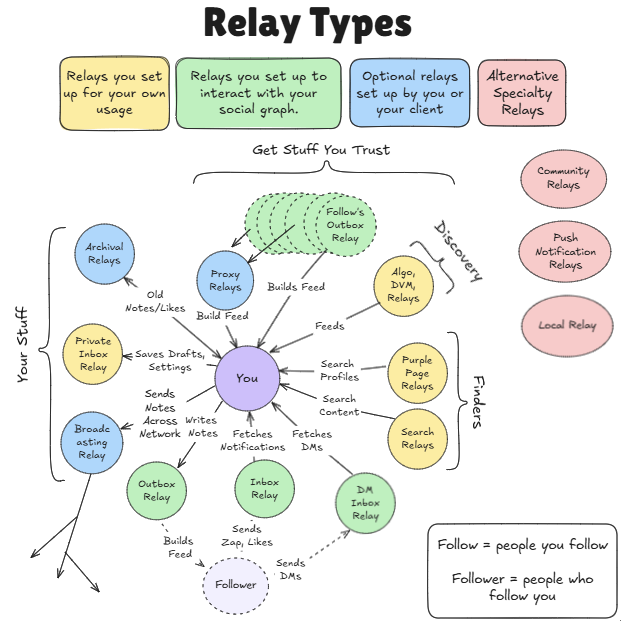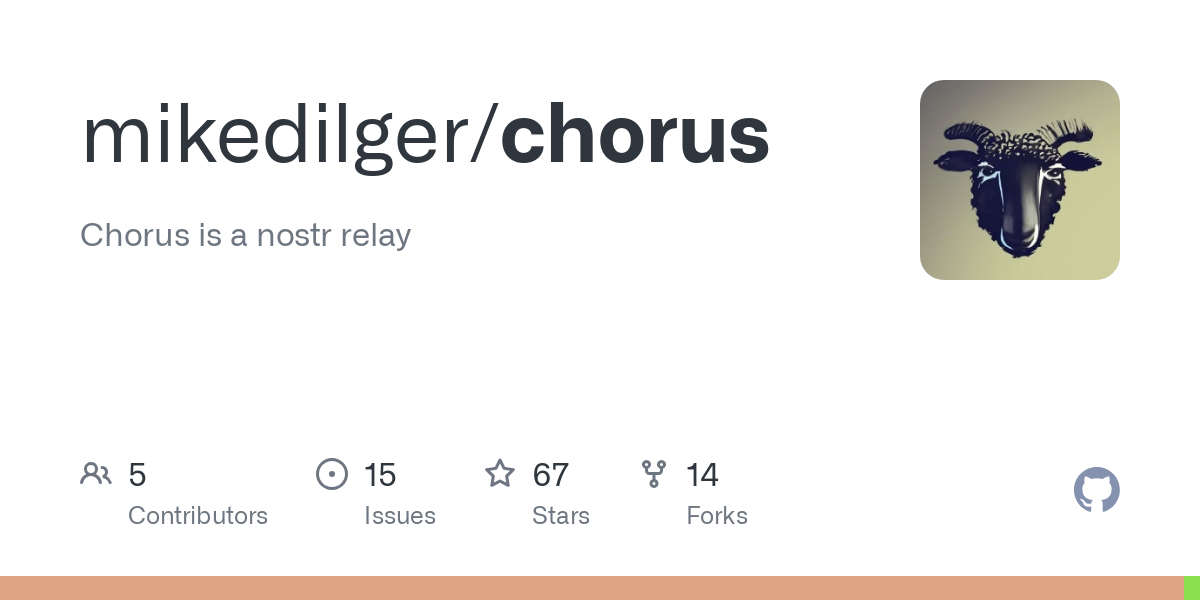The Relay Rundown
Understanding Relays
Relays are a very simple concept, but an incredibly powerful part of Nostr. They are simple servers, of sorts, with a specific set of tasks- to fetch, hold, and send notes. Relays don't communicate with each other, only with clients. The client sends a request for any relevant notes and the relays oblige. What types of notes (aka events) that each relay will hold or fetch will vary because of different relays will operate under different sets of rules. Some will accept most any type of event from anyone. Others can be very strict, requiring things like payment, proof-of-work, specific event kinds, or only allow a whitelist of users to reduce spam and other unwanted content. When you create an event, or publish a note, it is sent to your "write" or "outbox" relays. Anyone who follows your npub or sends "fetch" /"read" requests, to those relays will receive your notes. When someone replies, likes, or otherwise engages with your note, that note will then duplicate to any "write" or "outbox" relays that the other person is connecting to as their outbox relays. This does two important things:
- It creates a new event through through the action of engaging your note. This is a signed record of activity from that user's npub. This is also the event that is sent back to your "read" or "inbox" relays so that you may be notified that someone is interacting with you.
- By creating a copy, this helps ensure your note will be able to be spread across more of the ecosystem, expanding your reach and introducing redundancy, in case a relay should go down or disappear completely. This does not imply that your data will be safely stored forever. In fact, its the exact opposite. The protocol assumes that any relay, or many, could disappear at any time. A relay can shut down, kick you out, experience intentional or unintentional data loss, or many other things. It is likely that a copy of your notes will still exist on many relays, but if you are concerned with the longevity of your content, consider running your own. Paid services for long term note storage exists as well, but they do require trusting the provider.
In this light, the importance of relays starts to become obvious. The various rules open up a whole plethora of use cases that make relays interesting, unique, and useful for the user. They are the backbone of the protocol. They are also tools for finding and managing great social connections and great content.
Types of Relays
This section can, in no way, be considered comprehensive. It is nearly impossible to know all of the relay implementations that may exist or all the rules that they may have set for themselves. Here, we will address some common types that will be useful in making the most of Nostr and a few types with specialized tasks.
- Public Relays - Most Nostr clients will start new users with a predetermined set of relays that are free and publicly available for fetching and serving. This lowers the entry barrier for getting connected to the network, ensuring that everyone has access. It does come with some tradeoffs. Public relays tend to accept almost any type of content, so they are prone becoming the hosts of spam, bots, and shady content. To curate your space, it is recommended to get connected with some relays that help you clean things up.
- Web-of-Trust Relays - These relays use your social graph and the graphs of others to build a network of higher trust for its users. This reduces spam and other yucky stuff from making it into your feeds. For write access, you must be followed by someone else within the network. If you are coming to Nostr with no external social connection, these may not be useful at first, though most do allow for public reading so you may find them useful to discover people and content you find interesting. Once you have established some social connections, they are great for creating a feed that casts a wider net through the whole network.
- Paid Read/Write Filter Relays - These relays will charge an admission fee for write access. This helps to reduce spam and bots. Not all paying npubs want to see or interact with all who are willing to pay the fee, so a paid write relay often works best when paired with a paid filter relay for reading. These will operate under many sets of filtering rules, so be sure to read through any available material from the provider. They should explain what they filter and why, so that you may choose filters that match your tastes.
- Inbox Relays - These relays are tasked with collecting any events that are intended FOR you. This includes likes, replies, receipts, and mentions, among many other things. If socializing with your friends and colleagues is important to you, you will want to find inbox relays that manage this task well. DM inbox relays are a separate but similar concept, as direct messages are encrypted and wrapped. They are a specialized relay meant for handling encrypted events. Many DM inbox relays charge a subscription fee, some do not. This is also a great use case for private relays.
- Private Relays - These relays can be arranged to handle nearly anything you would like. You can whitelist a group of people that can write, restrict read access through AUTH, and set other various rules. They are a great option for any encrypted data, such as DMs, lists, and drafts. They also make a great backup for your own notes to help ensure that they remain available and locatable. Running your own is the optimal option here, but there are paid services, that I think of as relay rental. They are hosted on big servers, and managed by a small company. All details of the relay rules are at the renter's discretion. This is a good option if you do not have the hardware or confidence to set up your own private relay yet.
- Search Relays - Search relays can help you find specific users & notes across the wider network. Some specialize in searching for people, others for text, tags, and other criteria. A strong search relay can make navigating through Nostr a breeze. As with other things, some may require a small fee to use them and others are free to use. Try out some free ones before buying to see if you are happy with your experience.
- "Read" Relays - This is sort of a catchall term for anywhere that your client connects to for fetching notes and other events. In the best scenerio, you should not have to worry about these, as relays will signal for your client to find the notes you are fetching. The Nostr protocol and its mechanisms are adapting to what works, so being informed of "read" relays is essential for now. These are the places that you may need to tell your client to connect to when fetching notes from the people you follow.
- Specialized Relays - Specialized relays will vary in function and rules. Some are for curating quality feeds while others host full-fledge communities around a topic or common interest. Clients designed to interact with these more specialized use cases will often have relay information available or a method for you to browse their feeds.
This is just a snapshot of the different types of relays that exists now. Many are in development and testing for algorithmic content distribution, paywalled content, encrypted group messaging, limited read access, media hosting, and more. (This section may be updated as certain types gain or lose traction throughout the ecosystem.)

Managing Relays
By now, this probably feels like a ton of information and it is, but its also part of what gives you the ability to create and maintain a quality experience with Nostr. A truly decentralized system puts power into the user's hands rather than a corporation. If you want to be in control of your space (spatium tuum), relays are the first and foremost way to do that. They don't have to be viewed as boring servers. They are anything but that. They are tools that can enhance your online networking, serve you educational or entertaining content, or provide you with a safe place to store your personal thoughts. What you use them for is up to YOU.
Spend some time trying free ones, exploring relay feeds, or plugging into some paid services until you find a setup that creates a quality online space for you. If you're worried that you might "break" your connection, don't be. Make a note of a couple that you are connecting to when getting started, as a backup, but I feel confident to say that you won't ever look at it again.
Finding Relays
Finding relays can be a bit of a chore, but that is getting easier as time goes by. For now you there a few options you can try.
- Visit a relay explorer like nostr.watch or nostr.info
- Use a client that shows you which relays are hosting a note or a person's relay list. There are some examples in our client guide like Amethyst, Coracle, Jumble, and Nostrudel.
- Just ask. Most people are on a social network to be social. Currently, Nostr is brimming with social people who are passionate about freedom, decentralized communication, and Nostr in particular. They are happy to help.
Running Your Own
Relay.tools is a hosted personal relay service for ease and a user friendly experience. Search Zapstore for Citrine to run a native relay on your Android device.
Below are some suggestions for relays to run on your own hardware. Search "nostr relay" on GitHub for more.




nostr:nevent1qqsyghs4rrne69p6pl9l2tpltx4esz5g0ywn5838rjupe988nu5gmacpzemhxue69uhhyetvv9ujumn0wd68ytnzv9hxgq3q8sufer6dgm9gzvt8gw37x08dk8gxr8u80rh8f4rjv4m4u73wlalsdy36uy
published with habla.news



